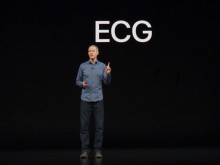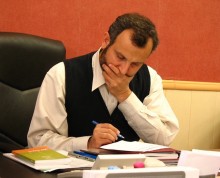For leaders in the Church today Pope Francis can sometimes be an enigma.
A sort of cottage industry of journalists and bloggers has flourished in the wake of this prolific and often spontaneous Pope. Recently I read a speech he delivered to the Eucharistic Youth Movement in Italy last August. His message essentially boiled down to a clarion call for the youth to embrace tension and engage in healthy conflict in their family and among their friends. Perhaps your first response to this is shock or perhaps even dismay? As I read the words though I had a moment of epiphany. In this short speech Pope Francis is calling out, not just the youth, but the rest of us as well, to stop avoiding conflict, thinking that false unity or peace built on avoidance and platitudes can serve to build up the kingdom of God. In fact he goes so far as to say avoiding needed conflict will lead to our death. In the speech Pope Francis asks, “What would a society, a family, a group of friends be like without tension and conflict? Do you know what it would be? A cemetery. Because only in dead things are there no tensions and no conflicts. When there is life, there is tension and there is conflict.”
This admonition to embrace healthy conflict is not an entirely new concept for me. I was introduced to the value of healthy conflict in The Advantage, by Patrick Lencioni. In this “business” classic, Lencioni defines healthy conflict as “productive ideological conflict” that avoids “the nasty kind that centers around people or personalities.” (pg. 38) At its root what makes ideological conflict healthy is that it is based on trust. “When there is trust, conflict becomes nothing but the pursuit of truth, an attempt to find the best possible answer.” (pg. 38) I think this is the kind of trust that Pope Francis wants to see more of in the Church, including among Church leaders.
In my work to help leaders along with their teams to develop greater organizational health I introduce them to the five behaviors that lead to cohesion for a team. The first two are trust and conflict. Most are very excited about developing greater trust with their team members. This is especially true in a church environment. Who wouldn’t want greater trust? But conflict, isn’t that a bad thing? Doesn’t it lead to hurt feelings and more difficulties on a team? This perception often leads good, faithful people to fear conflict and avoid it at all costs. Lencioni observes that, “Nowhere does this tendency toward artificial harmony show itself more than in mission-driven nonprofit organizations, most notably churches. People who work in those organizations tend to have a misguided idea that they cannot be frustrated or disagreeable with one another.” However, shouldn’t people who trust one another and are working to further the mission of Christ be willing to bear the difficulty of disagreeing with one another, so that God's will can be discerned and done?
Only conflict based on trust can build up, rather than tear down. Lencioni clarifies this when he says that conflict without trust “is politics, an attempt to manipulate others in order to win an argument regardless of the truth.” So what does this “healthy” conflict look like?
Pope Francis sees it like this: “It is clear that there is tension in the family. How does one resolve tension? With dialogue. When there is dialogue in a family, when there is the capacity to spontaneously speak one’s mind, tensions can be resolved very well.” Lencioni calls the “place” in which this dialogue occurs the ideal conflict point. It lies on a continuum between artificial harmony and mean-spirited personal attacks. It is constructive (based on trust and mutual respect) and is not allowed to become destructive (involving personal attacks or disrespect).
Pope Francis’ advice to the youth, and also to us, when seeking real unity is, “First, do not be afraid of tensions, because they make us grow; second, resolve tensions through dialogue, because dialogue unites, whether in the family or in a group of friends, and the path will be found to go on together, without losing one’s own identity; third, do not be too attached to tension because it will harm you.” These three points remind us who work for the Gospel that without growth and dialogue to unite us we will wither and die in our working relationships; and that if we become attached to tension we will never allow the decisions of our team to lead to unity and growth for the sake of the Gospel. As Pope Francis observes, “Conflicts can also do us good, for they make us understand differences, and make us understand that if we do not find a way to resolve this conflict, there will be a situation of war. Conflict, in order to be addressed properly, must be directed toward unity.”
Perhaps in this Holy Year of Mercy we may discover new ways to engage in conflict, healthy conflict, which will lead to greater unity and build up the Church.















